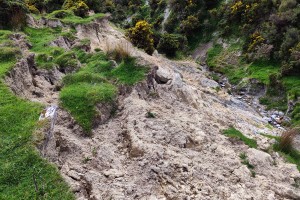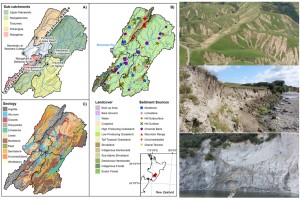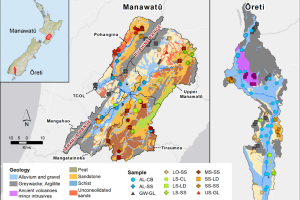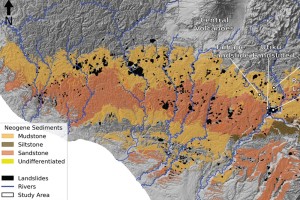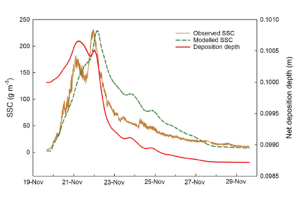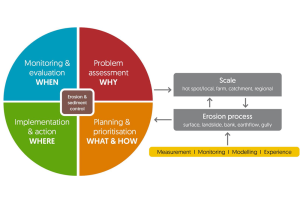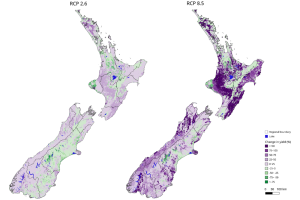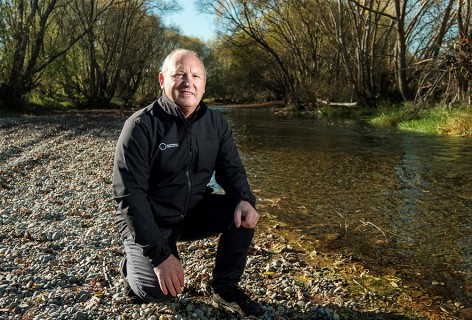Smarter Targeting of Erosion Control (STEC)
The NZ landscape is characterised by a complex array of erosion processes with high spatial and temporal variability, which provides a challenging environment for process-based erosion and sediment science and modelling. Our research will address global research questions and put NZ at the forefront of international research by significantly improving understanding of:
- spatial and temporal patterns of erosion
- sediment-related water quality
- sediment mitigation performance
- model refinement (e.g. from average annual to storm-event scale)
- the economic analysis of erosion and sediment mitigation.
STEC is a collaborative research programme led by Manaaki Whenua Landcare Research and includes researchers from NIWA, Massey University, Waikato University and international collaborators from KU Leuvin, IRSTEA, University of Salzburg, HAFL Switzerland. Our partners include Whanganui iwi (Tamaūpoko Community Group) and Rangitāne o Manawatū.
We are supported by Northland, Waikato, Horizons, Hawke’s Bay, Auckland Council, Environment Southland, Ministry for the Environment, Ministry for Primary Industry, Our Land & Water National Science Challenge, and Federated Farmers.
STEC News
Show all STEC newsKey researchers

John Dymond

Andrew Neverman
Publications & outputs
Yet to be submitted
Davies-Colley RJ, Hughes AO, Haddadchi A (in prep.). Suspended sediment properties and visual clarity in the Manawatu River. New Zealand Journal of Marine and Freshwater Research.
Doyle I et al. (in prep.). Rivers as records: a detailed record of landscape response to multiple forcings at varying spatial and temporal scales.
Doyle I et al. (in prep.). Characterisation and quantification of sediment sources in a volcanically influenced catchment.
Doyle I et al. (in prep.). A 4000-year record of flooding and erosion, understanding flooding and catchment response through time.
Dymond JR, Haddadchi A, Herzig A (in prep). A temporal erosion and sediment transport model for predicting water clarity in rivers. Journal of Hydrology.
Neverman AJ, Smith HG, Betts H (in prep). Drivers of slow-moving landslide dynamics and sediment delivery in a headwater catchment. Geomorphology.
Nisbet E et al. (in prep). Palaeo-activity of large, deep-seated landslides in the Whanganui-Rangitikei Hill Country, New Zealand.
Vale S et al (in prep) Investigating sediment source contributions over diverse flood events using sediment fingerprinting with geospatial datasets STOTEN.
Vale S et al. (in prep.). Temporal analysis of erosion activation and sediment source contribution in an instrumented hydrologically dynamic catchment.
2023
Marden M, Rowan D, Watson A 2023. Effect of changes in forest water balance and inferred root reinforcement on landslide occurrence and sediment generation following Pinus radiata harvest on Tertiary terrain, eastern North Island, New Zealand. New Zealand Journal of Forestry Science 53:4. https://doi.org/10.33494/nzjfs532023x216x
McIvor I, Mackay-Smith T, Spiekermann R 2023. Drivers and New Opportunities for Woody Vegetation Use in Erosion Management in Pastoral Hill Country in New Zealand. In: Dr. Shakeel M ed. Soil Erosion - Risk Modeling and Management. Rijeka, IntechOpen. Pp. Ch. 2
Neverman AJ, Donovan M, Smith HG, Ausseil A-G, Zammit C 2023. Climate change impacts on erosion and suspended sediment loads in New Zealand. Geomorphology: 108607. https://doi.org/10.1016/j.geomorph.2023.108607
Ngo HM, van Zadelhoff FB, Gasparini I, Plaschy J, Flepp G, Dorren L, Phillips C, Giadrossich F, Schwarz M 2023. Analysis of Poplar’s (Populus nigra ita.) Root Systems for Quantifying Bio-Engineering Measures in New Zealand Pastoral Hill Country. Forests 14(6): 1240. https://doi.org/10.3390/f14061240
Phillips C, Bloomberg M, Marden M, Lambie S 2023. Tree root research in New Zealand: a retrospective ‘review’ with emphasis on soil reinforcement for soil conservation and wind firmness. New Zealand Journal of Forestry Science 53:6. https://doi.org/10.33494/nzjfs532023x177x
Pooladsaz K, Holbling D (accepted). Monitoring the evolution of the Kaiwhata landslide in New Zealand using object-based image analysis and Sentinel-2 time series. GI Forum Journal.
Polyakov M, Daigneault A, Vale S, Phillips C, Smith H. (submitted). Cost-effectiveness of erosion mitigation to meet water clarity targets in the Manawatu-Wanganui Region of New Zealand. Journal of Environment Management.
Spiekermann RI, van Zadelhoff F, Schindler J, Smith H, Phillips C, Schwarz M 2023. Comparing physical and statistical landslide susceptibility models at the scale of individual trees. Geomorphology 440: 108870. https://doi.org/10.1016/j.geomorph.2023.108870
Smith HG, Neverman AJ, Betts H, Spiekermann R 2023. The influence of spatial patterns in rainfall on shallow landslides. Geomorphology: 108795. https://doi.org/10.1016/j.geomorph.2023.108795
Vale S, Smith H, Davies-Colley R, Dymond J, Hughes A, Haddadchi A, Phillips C 2023. The impact of erosion sources on sediment-related water quality attributes. Science of the Total Environment 160.452. http://dx.doi.org/10.1016/j.scitotenv.2022.160452
2022
Abad L, Hölbling D, Spiekermann R, Prasicek G, Dabiri Z, Argentin A-L 2022. Detecting landslide-dammed lakes on Sentinel-2 imagery and monitoring their spatio-temporal evolution following the Kaikōura earthquake in New Zealand. Sci. Total Environ., 820, 153335. https://doi.org/10.1016/j.scitotenv.2022.153335
Drummond JD, Aquino T, Davies-Colley R, Stott R, Krause S 2022. Modeling Contaminant Microbes in Rivers During Both Baseflow and Stormflow, Geophysical Research Letters 49(8). https://doi.org/10.1029/2021GL096514
Escobar-Ruiz V, Smith HG, Macdonald N, Penuela A 2022 Simulated event-scale flow and sediment generation responses to agricultural land cover change in lowland UK catchments. Hydrological Processes, 36: e14474. https://doi.org/10.1002/hyp.14474
Gall MP, Davies-Colley RJ, Milne JM, Stott R 2022. Suspended sediment and faecal contamination of a stormflow plume from the Hutt River in Wellington Harbour. New Zealand Journal of Marine and Freshwater Research 56: 389-409. https://doi.org/10.1080/00288330.2022.2088569
Haddadchi A, Rose CW 2022. A Physically Based Model of Deposition, Re-Entrainment, and Transport of Fine Sediment in Gravel-Bed Rivers. Water Resources Research 58(8): e2021WR031782. https://doi.org/10.1029/2021WR031782
McColl ST, Holdsworth CN, Fuller IC, Todd M, Williams F 2022. Disproportionate and chronic sediment delivery from a fluvially controlled, deep-seated landslide in Aotearoa New Zealand. Earth Surface Processes and Landforms 47(8): 1972-1988. https://doi.org/10.1002/esp.5358
Mackay-Smith TH, López IF, Burkitt LL, Reid JI 2022. Kanuka Trees Facilitate Pasture Production Increases in New Zealand Hill Country. Agronomy 12(7): 1701. https://doi.org/10.3390/agronomy12071701
Mackay-Smith TH, Burkitt LL, López IF, Reid JI 2022. The impact of a kānuka silvopastoral system on surface runoff and sediment and nutrient losses in New Zealand hill country. CATENA 213: 106215. http://dx.doi.org/10.2139/ssrn.4002314
Spiekermann RI, Smith HG, McColl S, Burkitt L, Fuller IC 2022. Quantifying effectiveness of trees for landslide erosion control. Geomorphology 396, 107993. https://doi.org/10.1016/j.geomorph.2021.107993
Spiekermann RI, Smith HG, McColl S, Burkitt L, Fuller IC 2022. Development of a morphometric connectivity model to mitigate sediment derived from storm-driven shallow landslides. Ecological Engineering 180(106676):106676. https://doi.org/10.1016/j.ecoleng.2022.106676
van Zadelhoff FB, Albaba A, Cohen D, Phillips C, Scahefli B, Dorren LKA, Schwarz M 2022. Introducing SlideforMap: a probabilistic finite slope approach for modelling shallow landslide probability in forested situations. Nat. Hazards Earth Syst. Sci. 22(8): 2611-2635. https://doi.org/10.5194/nhess-22-2611-2022
Vale S, Swales A, Smith HG, Olsen G, Woodward B 2022. Impacts of tracer type, tracer selection, and source dominance on source apportionment with sediment fingerprinting. Science of The Total Environment, 154832. https://doi.org/10.1016/j.scitotenv.2022.154832
2021
Davies-Colley RJ, Hughes AO. Vincent A, Heubeck S 2021. Weak numerical comparability of ISO7027-compliant nephelometers. Ramifications for turbidity measurement applications. Hydrological Processes 35(12). https://doi.org/10.1002/hyp.14399
Mackay-Smith TH, Burkitt L, Reid J, Lopez IF, Phillips C 2021. A Framework for Reviewing Silvopastoralism: A New Zealand Hill Country Case Study. Land, 10, 1386. https://doi.org/10.3390/land10121386
Smith HG, Spiekermann R, Betts H, Neverman AJ 2021. Comparing methods of landslide data acquisition and susceptibility modelling: Examples from New Zealand. Geomorphology, 381, 107660. https://doi.org/10.1016/j.geomorph.2021.107660
Spiekermann RI, McColl S, Fuller I, Dymond J, Burkitt L, Smith HG 2021. Quantifying the influence of individual trees on slope stability at landscape scale. J. Environ. Manage. 286, 112194. https://doi.org/10.1016/j.jenvman.2021.112194
Hughes AO, Huirama MK, Owens PN, Petticrew EL 2021. Stream bank erosion as a source of sediment within New Zealand catchments. New Zealand Journal of Marine and Freshwater Research https://doi.org/10.1080/00288330.2021.1929352
Marden M, Lambie S, Burrows L 2021. Species-specific basic stem-wood densities for twelve indigenous forest and shrubland species of known age, New Zealand. New Zealand journal of forestry science 51(1). https://doi.org/10.33494/nzjfs512021x121x
Phillips CJ, Hales T, Basher L, Smith H 2021. Shallow landslides and vegetation at the catchment scale: a perspective. Ecological Engineering 173. https://doi.org/10.1016/j.ecoleng.2021.106436
Vale S, Smith HG, Matthews A, Boyte S 2021. Determining sediment source contributions to overbank deposits within stopbanks in the Oroua River, New Zealand, using sediment fingerprinting. Journal of Hydrology (NZ) 59(2): 147-172.
Williams F, McColl S, Fuller I, Massey C, Smith H, Neverman A 2021. Intersection of fluvial incision and weak geologic structures cause divergence from a universal threshold slope model of landslide occurrence. Geomorphology 107795. https://doi.org/10.1016/j.geomorph.2021.107795
2020
Basher LR, Clapcott J, Hicks DM, Phillips C, Forrester G 2020. Spatial and temporal patterns of deposited fine sediment in the Motueka River catchment, New Zealand. Journal of Hydrology (NZ) 59 (2): 109-134.
Basher L, Spiekermann R, Dymond J, Herzig A, Hayman E, Ausseil A-G 2020. Modelling the effect of land management interventions and climate change on sediment loads in the Manawatu-Whanganui region. New Zealand Journal of Marine and Freshwater Research. https://doi.org/10.1080/00288330.2020.1730413
Davies-Colley R, Hughes A 2020. Sediment-related water quality of small hill-country streams near Whatawhata, New Zealand. Response to integrated catchment management (ICM), New Zealand Journal of Marine and Freshwater Research. https://doi.org/10.1080/00288330.2020.1761840
Feeney CJ, Chiverrell RC, Smith HG, Hooke JM, Cooper JR 2020. Modelling the decadal dynamics of reach-scale river channel evolution and floodplain turnover in CAESAR-Lisflood. Earth Surface Processes and Landforms 45: 1273-1291. https://onlinelibrary.wiley.com/doi/abs/10.1002/esp.4804
Fuller IC, Strohmaier F, McColl ST, Tunnicliffe J, Marden M 2020. ‘Badass gully morphodynamics and sediment generation in Waipaoa Catchment, New Zealand’. Earth Surface Processes and Landforms 45(15): 3917–3930. https://doi.org/10.1002/esp.5010
Gasser E, Perona P, Dorren L, Phillips C, Hubl J, Schwarz M 2020. A new framework to model hydraulic bank erosion considering the effects of roots. Water 12: 893. https://doi.org/10.3390/w12030893
Marden M, Lambie S, Phillips C 2020. Potential effectiveness of low-density plantings of manuka (Leptospermum scoparium) as an erosion mitigation strategy in steeplands, northern Hawke’s Bay, New Zealand. New Zealand Journal of Forestry Science 50. https://doi.org/10.33494/nzjfs502020x82x
McIvor I, Marden M, Douglas G, Hedderley D, Phillips C 2020. Influence of soil type on root development and above- and below-ground biomass of 1-3 year-old Populus deltoides x nigra grown from poles. International Journal of Environmental Sciences & Natural Resources 24(3). https://dx.doi.org/10.19080/IJESNR.2020.24.556138
2019
Escobar-Ruiz V, Smith HG, Blake W, Macdonald N. 2019. Assessing the performance of a physically-based hydrological model using a proxy-catchment approach in an agricultural environment. Hydrological Processes 33: 3119-3137. https://doi.org/10.1002/hyp.13550
Fuller IC, Macklin M, Toonen WHJ, Turner J, Norton K 2019. A 2000 year record of palaeofloods in a volcanically-reset catchment: Whanganui River, New Zealand. Global and Planetary Change 181: 102981. https://doi.org/10.1016/j.gloplacha.2019.102981
Gaspar L, Blake WH, Smith HG, Lizaga I, Navas A 2019. Testing the sensitivity of a multivariate mixing model using geochemical fingerprints with artificial mixtures. Geoderma 337: 498-510. https://doi.org/10.1016/j.geoderma.2018.10.005
Smith HG, Spiekermann R, Dymond J, Basher L 2019. Predicting spatial patterns in riverbank erosion for catchment sediment budgets. New Zealand Journal of Marine and Freshwater Research 53(3): 338–362. DOI https://www.tandfonline.com/doi/full/10.1080/00288330.2018.1561475
Vale S, Dymond J 2019. Interpreting nested storm event suspended sediment-discharge hysteresis relationships at large catchment scales. Hydrological Processes 2019: 1-21. https://doi.org/10.1002/hyp.13595
